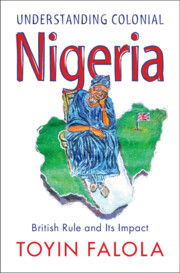Book contents
- Understanding Colonial Nigeria
- Understanding Colonial Nigeria
- Copyright page
- Dedication
- Contents
- Figures
- Maps
- Preface
- Acknowledgments
- Timeline of Events
- Part I Introduction
- Part II Conquest and Colonization
- Part III Colonial Societies
- 8 World War I and Its Aftermath
- 9 The Interwar Years
- 10 Indirect Rule and the Native Administration
- 11 The Legal System and Law Enforcement
- 12 Colonial Economy
- 13 Western Education
- 14 Social Changes
- 15 Women
- 16 Religions
- 17 Health and Medicine
- 18 Cultures
- 19 Urbanization
- 20 Creativity and Aesthetics
- Part IV Nationalism and Independence
- Part V Conclusion
- Bibliography
- Index
9 - The Interwar Years
from Part III - Colonial Societies
Published online by Cambridge University Press: 21 November 2024
- Understanding Colonial Nigeria
- Understanding Colonial Nigeria
- Copyright page
- Dedication
- Contents
- Figures
- Maps
- Preface
- Acknowledgments
- Timeline of Events
- Part I Introduction
- Part II Conquest and Colonization
- Part III Colonial Societies
- 8 World War I and Its Aftermath
- 9 The Interwar Years
- 10 Indirect Rule and the Native Administration
- 11 The Legal System and Law Enforcement
- 12 Colonial Economy
- 13 Western Education
- 14 Social Changes
- 15 Women
- 16 Religions
- 17 Health and Medicine
- 18 Cultures
- 19 Urbanization
- 20 Creativity and Aesthetics
- Part IV Nationalism and Independence
- Part V Conclusion
- Bibliography
- Index
Summary
This chapter continues the discussion on Nigeria during the interwar years (1918–1939). It shifts focus away from the reasoning behind colonial actions and paying more attention to their consequences for Nigeria. The interwar years in Nigeria were characterized by the onset of a decade-long economic depression caused by the global Great Depression and the increasing marginalization of local economic activity by private and colonial forces. This marginalization was promoted to increase the profitability of Nigeria’s growing extractive economy at the expense of native economic actors. This, along with the growing development of a new, educated, native elite, would see the growth of “official” indigenous organizations. The bulk of this chapter focuses on the development of these organizations such as the West African Students Union (WASU) or the Nigerian National Democratic Party (NNDP), and details the growth of resistance movements fostered by the said establishments. They would demand greater representation in the colonial government, construct economic support groups, and attempt to end disparages in higher education. The chapter also explores alternative responses to colonialism, including the growth of organized crime and widespread regional migration. Finally, the chapter explores the different sociopolitical dynamics in Northern Nigeria.
Keywords
- Type
- Chapter
- Information
- Understanding Colonial NigeriaBritish Rule and Its Impact, pp. 196 - 214Publisher: Cambridge University PressPrint publication year: 2024

